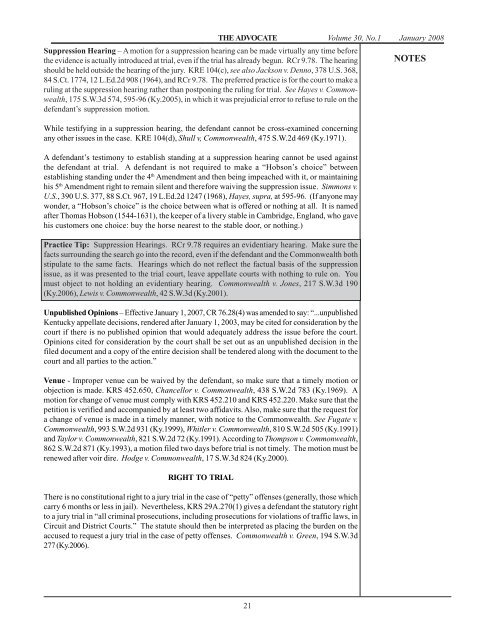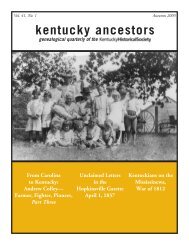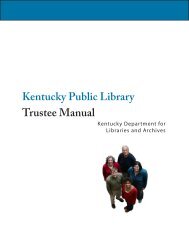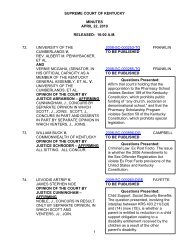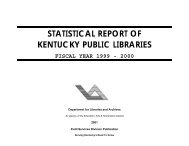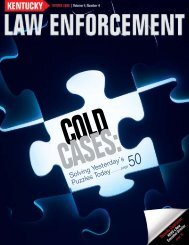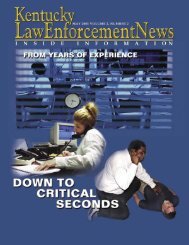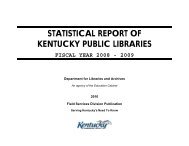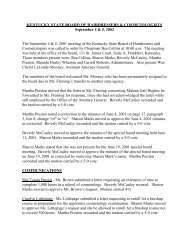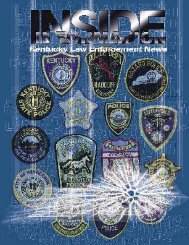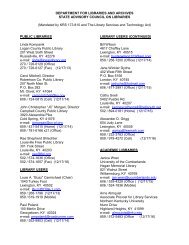Jan08 Advo.pmd - e-archives Home
Jan08 Advo.pmd - e-archives Home
Jan08 Advo.pmd - e-archives Home
You also want an ePaper? Increase the reach of your titles
YUMPU automatically turns print PDFs into web optimized ePapers that Google loves.
THE ADVOCATE Volume 30, No.1 January 2008<br />
Suppression Hearing – A motion for a suppression hearing can be made virtually any time before<br />
the evidence is actually introduced at trial, even if the trial has already begun. RCr 9.78. The hearing<br />
should be held outside the hearing of the jury. KRE 104(c), see also Jackson v. Denno, 378 U.S. 368,<br />
84 S.Ct. 1774, 12 L.Ed.2d 908 (1964), and RCr 9.78. The preferred practice is for the court to make a<br />
ruling at the suppression hearing rather than postponing the ruling for trial. See Hayes v. Commonwealth,<br />
175 S.W.3d 574, 595-96 (Ky.2005), in which it was prejudicial error to refuse to rule on the<br />
defendant’s suppression motion.<br />
While testifying in a suppression hearing, the defendant cannot be cross-examined concerning<br />
any other issues in the case. KRE 104(d), Shull v, Commonwealth, 475 S.W.2d 469 (Ky.1971).<br />
A defendant’s testimony to establish standing at a suppression hearing cannot be used against<br />
the defendant at trial. A defendant is not required to make a “Hobson’s choice” between<br />
establishing standing under the 4 th Amendment and then being impeached with it, or maintaining<br />
his 5 th Amendment right to remain silent and therefore waiving the suppression issue. Simmons v.<br />
U.S., 390 U.S. 377, 88 S.Ct. 967, 19 L.Ed.2d 1247 (1968), Hayes, supra, at 595-96. (If anyone may<br />
wonder, a “Hobson’s choice” is the choice between what is offered or nothing at all. It is named<br />
after Thomas Hobson (1544-1631), the keeper of a livery stable in Cambridge, England, who gave<br />
his customers one choice: buy the horse nearest to the stable door, or nothing.)<br />
Practice Tip: Suppression Hearings. RCr 9.78 requires an evidentiary hearing. Make sure the<br />
facts surrounding the search go into the record, even if the defendant and the Commonwealth both<br />
stipulate to the same facts. Hearings which do not reflect the factual basis of the suppression<br />
issue, as it was presented to the trial court, leave appellate courts with nothing to rule on. You<br />
must object to not holding an evidentiary hearing. Commonwealth v. Jones, 217 S.W.3d 190<br />
(Ky.2006), Lewis v. Commonwealth, 42 S.W.3d (Ky.2001).<br />
Unpublished Opinions – Effective January 1, 2007, CR 76.28(4) was amended to say: “...unpublished<br />
Kentucky appellate decisions, rendered after January 1, 2003, may be cited for consideration by the<br />
court if there is no published opinion that would adequately address the issue before the court.<br />
Opinions cited for consideration by the court shall be set out as an unpublished decision in the<br />
filed document and a copy of the entire decision shall be tendered along with the document to the<br />
court and all parties to the action.”<br />
Venue - Improper venue can be waived by the defendant, so make sure that a timely motion or<br />
objection is made. KRS 452.650, Chancellor v. Commonwealth, 438 S.W.2d 783 (Ky.1969). A<br />
motion for change of venue must comply with KRS 452.210 and KRS 452.220. Make sure that the<br />
petition is verified and accompanied by at least two affidavits. Also, make sure that the request for<br />
a change of venue is made in a timely manner, with notice to the Commonwealth. See Fugate v.<br />
Commonwealth, 993 S.W.2d 931 (Ky.1999), Whitler v. Commonwealth, 810 S.W.2d 505 (Ky.1991)<br />
and Taylor v. Commonwealth, 821 S.W.2d 72 (Ky.1991). According to Thompson v. Commonwealth,<br />
862 S.W.2d 871 (Ky.1993), a motion filed two days before trial is not timely. The motion must be<br />
renewed after voir dire. Hodge v. Commonwealth, 17 S.W.3d 824 (Ky.2000).<br />
RIGHT TO TRIAL<br />
There is no constitutional right to a jury trial in the case of “petty” offenses (generally, those which<br />
carry 6 months or less in jail). Nevertheless, KRS 29A.270(1) gives a defendant the statutory right<br />
to a jury trial in “all criminal prosecutions, including prosecutions for violations of traffic laws, in<br />
Circuit and District Courts.” The statute should then be interpreted as placing the burden on the<br />
accused to request a jury trial in the case of petty offenses. Commonwealth v. Green, 194 S.W.3d<br />
277 (Ky.2006).<br />
21<br />
NOTES


